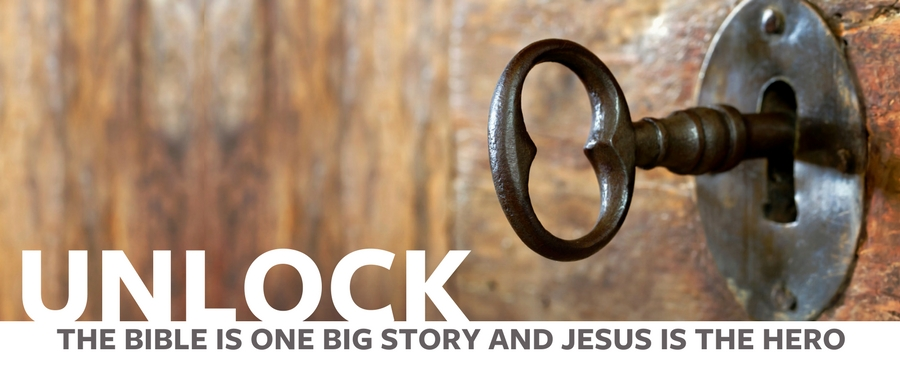

LAUNCH
Alex became a Christ-follower a few months ago. His new Christian friends always say how important it is to read the Bible, but Alex has never read much of it. He just doesn’t know where to start. The book is huge, there are a bunch of strange names in it and he is just so intimidated by it. He knows it is important to read the Bible for himself, but he has a hard enough time reading his books for school, much less figuring out this big old book. What advice would you give to Alex?
EXPLORE
1. Read Psalm 119:105. How can the Bible help light our path in life?
2. The Bible is one big story told with a lot of little stories. This big story is composed of many smaller books — like a library. The Bible has two main divisions. Look at the timeline. What event separates the New Testament from the Old Testament?
3. According to the timeline, about how long did it take to write the Bible?
4. Deal out all the cards. The person with the Law card will start.
- Show everyone the picture on the card.
- If you want, ask everyone “What do you think this section is about?”
- Then read from the back of the card. Have someone summarize what you read in their own words. Then place the card on the timeline.
Continue through all 8 cards in the order of the timeline until all the cards are read.
APPLY:
5. As we read through the cards, which section sounded most interesting to you?
6. What did you learn today that helped you understand the Bible better?
7. If you want to start reading the Bible for yourself, where could you start?

LAUNCH
The Bible is like a treasure box full of good things. Our job is to find these good things and be able to use them.
EXPLORE
1. Read 2 Timothy 3:14-17. What seems to be the thing Paul most wanted Timothy to do (verse 14)?
2. Where do you see the Bible mentioned in this passage?
3. According to this passage, what are three or four things the Bible can do in your life?
4. Read Hebrews 4:12.What does it mean that the Word of God is alive and powerful?How is that different than any other book?
APPLY
5. The Bible has helped people for hundreds of years. How could reading the Bible help you personally?
6. Does reading the Bible seem hard, scary or boring to you? Why? What keeps you from reading it more often?
Reading the Bible can be hard, but it is worth it. All day long we are being bombarded by false messages about life. The world tells us that our main goal in life should be personal fulfillment, success, pleasure, friends, money, and being happy, but life is about so much more. To find out what life is really about, we need to regularly listen to messages from the One who created us. God made us and knows our purpose and what will truly bring us lasting satisfaction. The Bible is God’s main way of communicating those truths to us. It is where we can find real truth about life, not just the fluff that the world offers.
7. Often, we don’t read the Bible because we don’t know where to start and we don’t really know how to study it. Today we are going to talk about one simple way to read the Bible called “3 Symbol Bible Reading”.
3 Symbol Bible Reading
1. Pray for God to speak to you through His Word.
2. Read – Read the next chapter in your Bible. The book of John is a good place to start. If the whole chapter is too long for you, just read a part of the chapter.
3. Stop reading when something pops out to you. Pay attention to the word or thought that pops out to you and how you feel about it.
4. Mark it up! It’s ok to write in the Bible, in fact, it’s really helpful!
- Draw a lightbulb beside whatever pops out to you as important. Write your thoughts about it in the margin of your Bible.
- Draw a question mark by anything you don’t understand or have a question about. Write the question in the margins of your Bible.
- Draw an arrow beside anything that you should apply personally to your life.
- If you are using your phone and can’t mark it up, use your notes app to write down your “pops” and any questions that you have.
5. Talk about it – When you’re done reading, talk to God through prayer or write in a journal to God about what pops out to you on the page and the questions you had. Ask God to give you the power to do what the passage says. If you’re in a group, talk with each other about what God taught you as you read.
If you weren’t able to find answers to your question marks, text a leader, pastor, or a Christian friend that might know a little more than you. Talking about our questions helps us all grow and learn more about God’s word together.
8. Let’s try this right now with a passage of the Bible. Open your Bible to Matthew 6:25-34 and study it with the 3 Symbol method.
9. How can you see “3 Symbol Bible Reading” making a difference in your life as you do it regularly?
The 31 DAY CHALLENGE:
Here’s a way to get started. Take the 31-day challenge and read the Bible every day for 31 days. Start in the book of John and see how a month in God’s word can impact your life!

LAUNCH
Kadarius and Terence were walking around the city looking for a birthday gift for Terence’s girlfriend Candice. She wanted a really nice watch, and he had been saving up for months to get the brand he knew she liked. They had been shocked to see the prices at the big-name department store and decided to get a hamburger and talk about it. On their way to the restaurant a man approached them and opened a case full of expensive watches. They couldn’t believe the bargain prices, and Terence snapped one up right away. “Candice will love this,” he told Kadarius. He was right. Candice did love it until the day after her birthday when it quit working and the watch band fell apart. Where did Terence go wrong?
Today we are talking about how the Bible is reliable, like the real watch, not the fake one. How do we know we can trust the Bible to be so reliable that we can base how we live our lives upon it?
EXPLORE
1. Let’s play a game to help us learn how we can trust the Bible. Read the verses. Then match them with the description that fits best.
Verses
- Luke 1:1-4
- Romans 1:1-4
- 2 Timothy 3:16-17
- 2 Peter 1:16-21
- Matthew 24:35
Descriptions
- Explains that the Bible is inspired by God, which literally means “God-breathed.”
- Shows that the author got his facts about Jesus through careful research and from eye-witnesses to his life.
- Human authors wrote the Bible as God’s Spirit directed them.
- Jesus’ words will never pass away.
- Jesus’ return from the dead proves he’s God and that everything he says–including his words about the reliability of the Bible–are true.
APPLY
2. Why would it matter to your faith whether the Bible is something we can trust?
Determining whether the Bible is something we can trust isn’t a science question that you can test in a lab. It is more of a courtroom question where you weigh evidence and decide what is most reasonable. On the next page, we have a few pieces of the many evidences for the Bible’s trustworthiness. We hope that helps you become more confident that you can trust the Bible.
3. Look at the “Evidence” list. There are eight pieces of evidence listed there that help us trust that the Bible is God’s Word. Below the line are eight sentences that tell why each evidence is valuable to us. Match the evidence to the meaning by writing the number of the evidence in the box.
4. Which piece of evidence do you think is most important for your friends to understand and why?
5. If this were a game show and I was going to give you a million dollars to know the right answer to the question, “Can I trust the Bible?”, what would you say? Would you research it to find out more?
A short study like this can only scratch the surface of this topic. The evidence about the trustworthiness of the Bible is overwhelming. If you have questions about the trustworthiness of the Bible or want to dig more into this topic, here are a few great places to start…
- WEBSITE – WHY YOU CAN BELIEVE THE BIBLE – article from EveryStudent.com
- BOOK – Josh McDowell’s More than a Carpenter
VIDEO – https://youtu.be/DYdR0HBzk1o
EVIDENCES
Evidence 1 : At least 10 non-Christian writers living around the time of Jesus also talked about him, and what they said was consistent with what the Bible says.
Evidence 2 : The Bible was written by over 40 authors in vastly different walks of life (poor shepherd, fisherman, king, prisoner, etc.) over the span of 1500 years, but has one consistent message.
Evidence: Scholars continue to prove the Bible by finding physical evidence (archaeology) of the stories in the Bible. Not a single find from the world of archaeology has conflicted with what the Bible records. In fact, many archaeologists have been aided in their search by the descriptions in the Bible.
Evidence 4 : Some people claim that the Bible is full of contradictions but, when asked, they can’t name any. When they do bring them up, a closer look at the Bible shows that the contradiction was really just a misunderstanding of what the Bible was really saying.
Evidence 5 : There are 24,000 ancient manuscripts of the New Testament compared to 643 of Homer’s Iliad, and only 7 copies of Plato — many more than any other ancient writing.
Evidence 6 : There are over 140 details in the Gospels that only eyewitnesses would have known or written down.
Evidence 7 : The writers of the Bible include very embarrassing stories about themselves that make them look bad.
Evidence 8 : The writers of the New Testament were killed by rulers who wanted them to admit that they were lying about what they wrote. These writers would not admit to lying. They decided to die instead.
MEANINGS
Meaning: These details point to the fact that the Gospels in the New Testament were written by people who were actually there, not written years later by someone making it up.
Meaning: Any human book written like this would have drastically different views and contradictions. The fact that the Bible is consistent in its view throughout points toward the Bible as a divine book, written by God through these men.
Meaning: This shows that Jesus was a real historical person and that he was well-known at the time even by non-Christians.
Meaning: Knowing that the Bible doesn’t contradict itself gives us confidence that it is true and worth reading and applying to our lives.
Meaning: If someone were making these stories up about themselves, they would have left out the parts that make them look bad. The fact that they left them in makes it more likely that they were writing the truth about what happened.
Meaning: No one would die for a lie. If they made up the stories about Jesus and the early church, they would have chosen to admit that before they were killed, but every one of them chose to die instead. This is evidence that what they died for is true.
Meaning: This gives us more confidence that the stories in the Bible actually happened in real places as we find evidence of them still today.
Meaning: Manuscripts are really, really old copies of these books. If we trust our copies of Homer’s Iliad and Plato to be accurately translated over the years, we should also trust the New Testament that has far more, and more reliable, manuscripts than any other ancient writing.

LAUNCH
Jerod, Alex, and Alicia stared at 1000 jigsaw puzzle pieces on the table. They thought putting this puzzle together would be fun, but then they realized that they didn’t have the box top. Without a big picture of what the whole puzzle is supposed to look like, it was hard to know how the individual pieces fit together. They decided to watch a movie instead.
How does having the box top of a puzzle make it easier to understand how the pieces fit together? If the Bible had a key that would help you see how the different parts fit together, would you want to know about it?
EXPLORE
Today we are going to take a look at how Jesus is the key to opening up the deeper meaning of the Bible. The Bible is not just a collection of random stories, but is actually one big story about God’s rescue plan to save his people. At the center of that story is Jesus, the hero. The Old Testament points forward to him and the New Testament points back to him. Let’s take a look at some passages in the Bible to see if we can find him in them.
1. Read Genesis 1:1, Colossians 1:15-17, and John 1:3-4. What part did Jesus take in the Creation?
2. Read Genesis 12:1-3. What is at the core of God’s promise to Abram (Abraham)?
3. Galatians 3:6-9. What do these verses say about how God will bless all nations through Abraham?
4. King David was one of the greatest kings in Israel’s history. In 2 Samuel 7:12-13, what does God promise David? One thousand years later, an angel speaks to Mary (Jesus’ mom) about her son in Luke 1:31-33. What light does this shine on God’s promise to David?
5. When Isaiah 53:10-12 was written, people had hope because this prophecy was promising a savior, and the people needed one! However, they didn’t know who this person would be. Hundreds of years later, Jesus’ friend John wrote 1 John 4:9-10. How do these verses from 1 John help us better understand the Isaiah passage?
6. Read Isaiah 50:6. How does the story about Jesus in Matthew 26:65-67 help explain what is said in Isaiah?
READ: The entire Old Testament sets the stage for Jesus. From God’s promise to Abraham that he would bless the whole world through him, to David pointing to the King of Kings to come (Jesus), to the prophets giving all kinds of details about this “coming savior,” it all points to Jesus.
The New Testament explains how Jesus pays for our sins and is important to our everyday lives. He puts our current trials into perspective because we can know that he will return one day, making every wrong right and bringing us to God forever. Jesus is the hero of the Bible and is the key that helps us understand what the Bible is really about.
APPLY
7. How would it change your understanding of the Bible if you asked, “How does this passage point to Jesus?” whenever you read the Bible?
8. How does it change the way you see hard circumstances if you understand that Jesus is the hero (not you or me)?
9. If one of your friends asked you what the Bible was about, what would you say?
Leave A Reply
